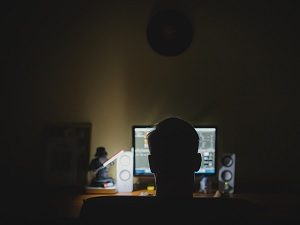 On computer monitors at cybersecurity companies around the country, animated world maps show live cyber-attacks happening around the world. The attacks targeting the United States are often directed at health care systems, government offices, and regular people who are working on their computers. The attacks are often administered through email attachments and links, and websites that contain links to malware. It's easy to look at those animated maps and realize we are at war.
On computer monitors at cybersecurity companies around the country, animated world maps show live cyber-attacks happening around the world. The attacks targeting the United States are often directed at health care systems, government offices, and regular people who are working on their computers. The attacks are often administered through email attachments and links, and websites that contain links to malware. It's easy to look at those animated maps and realize we are at war.
"The cyberwar has replaced the Cold War. And it's really a cyber-pandemic," says Adam Levin, the founder of Cyberscout and an expert on cybersecurity.
Levin believes hackers are targeting people these days who are working from home due to the pandemic. The threat is even greater if those employees are using their personal computers rather than company-issued laptops with loaded anti-virus and anti-malware software.
"Many computers are being shared among the family and kids. I have an 8-year-old son and they could be weapons of mass destruction when it comes to family," Levin says.
It could happen as easily as this. An employee working from home uses their personal computer. Someone also uses that computer to check email, social media, or play games. If someone clicks on a link a hacker sends, malware is installed on the computer which allows the hacker to tap into the employer's server. Levin says, it happens and it's almost impossible to catch the bad guys.
"It could be anyone, anywhere for any reason with the technical skills to do it. And the truth is, a lot of the tools they use, a lot of the ways they operate now, you can find online very inexpensively."
We fear nuclear war but it requires billions of dollars and years of development. But someone in a basement somewhere can pull off a devastating cyberattack that takes down the critical infrastructure for practically nothing. Russia and China have state-sponsored hacker groups that have successfully infiltrated government computer systems and are constantly attacking networks in the U.S. Levin says they're using the pandemic to catch us off guard.
"If there were ever a moment of distraction and vulnerability, this is it. And hackers rely on the distraction that creates vulnerabilities," Levin says.
It isn't just other nations attacking the targets in the United States. The U.S. attacked Russia's power grid less than 2 years ago. So this really is a cyber-world war. Levin says, be vigilant. Be careful what you do online. And never use the same password for multiple accounts. It not only protects you personally but could keep your company and others safe.
Resource: WRCBtv



